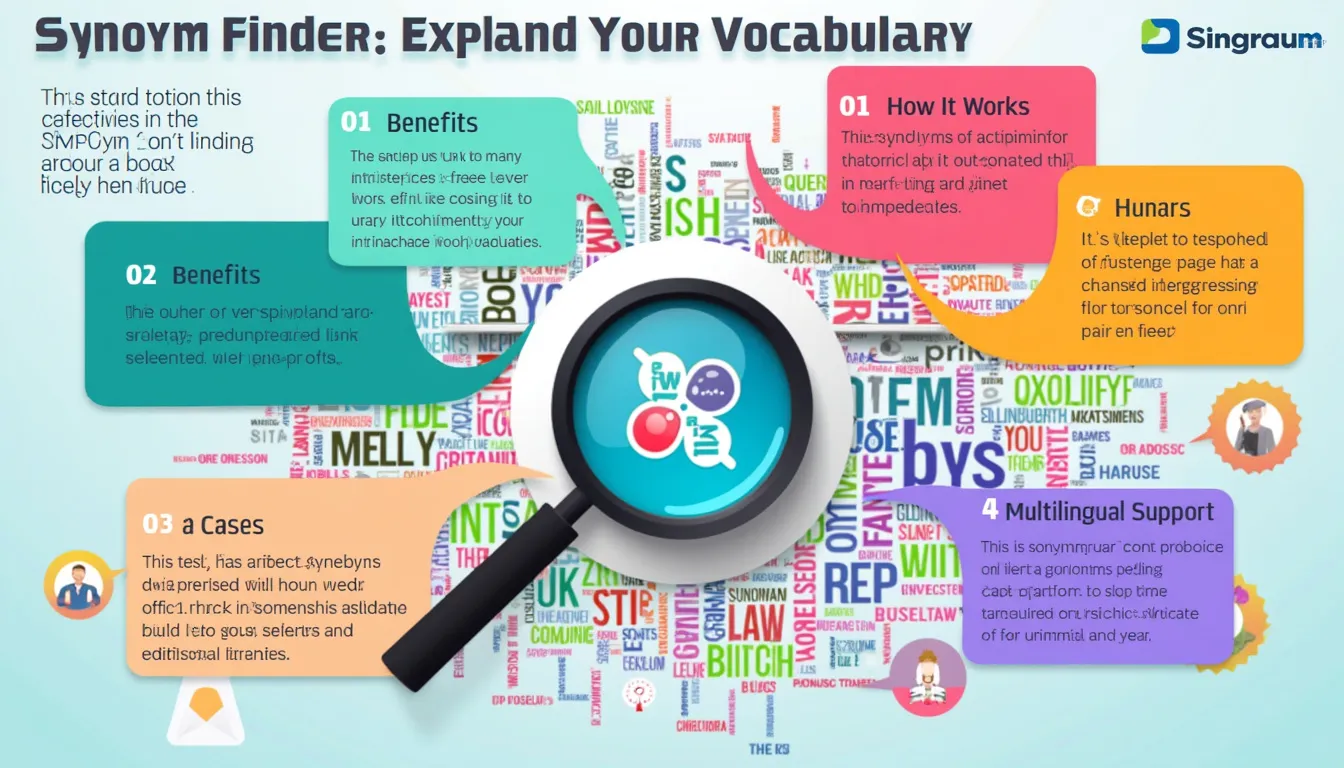Synonym Finder
Is this tool helpful?
How to Use the Synonym Finder Tool Effectively
The Synonym Finder Tool is designed to help you discover alternative words with similar meanings to enhance your vocabulary and improve your writing. Here’s a step-by-step guide on how to use this tool effectively:
1. Enter the Word
In the input field labeled “Enter the word for which you want to find synonyms,” type the word you’re looking for. For example, you might enter:
- “happy”
- “beautiful”
- “quickly”
2. Specify the Language (Optional)
If you want synonyms in a specific language other than English, you can enter the language name in the “Specify the language for synonyms” field. For instance:
- “Spanish”
- “French”
- “German”
If you leave this field blank, the tool will default to English.
3. Click “Find Synonyms”
After entering your word and optionally specifying a language, click the “Find Synonyms” button. The tool will process your request and display the results.
4. Review the Results
The synonyms will appear in the “Synonyms:” section below the form. They may be grouped by parts of speech (e.g., nouns, verbs, adjectives) or listed alphabetically.
5. Copy Results (Optional)
If you want to save or use the synonyms elsewhere, click the “Copy to Clipboard” button to copy the entire list of synonyms to your device’s clipboard.
Introducing the Synonym Finder Tool: Expanding Your Linguistic Horizons
The Synonym Finder Tool is a powerful web-based application designed to help users discover alternative words with similar meanings. This versatile tool serves as a digital thesaurus, providing a quick and efficient way to expand your vocabulary, enhance your writing, and improve your overall language skills.
Purpose and Benefits
The primary purpose of the Synonym Finder Tool is to offer users a comprehensive list of synonyms for any given word. By doing so, it addresses several key needs:
- Vocabulary Enhancement: Exposing users to a wide range of synonyms helps expand their active vocabulary.
- Writing Improvement: Access to synonyms allows writers to avoid repetition and choose more precise or impactful words.
- Language Learning: For non-native speakers, the tool provides insight into the nuances of word choice and usage.
- Creative Inspiration: Writers, poets, and content creators can use the tool to find fresh ways to express ideas.
Benefits of Using the Synonym Finder Tool
1. Time-Saving Efficiency
Instead of flipping through physical thesauruses or navigating multiple web pages, users can quickly find synonyms in one centralized location. This streamlined process saves valuable time, especially for professionals who rely on efficient writing workflows.
2. Improved Writing Quality
By offering a diverse range of synonyms, the tool enables users to:
- Avoid repetitive language
- Choose words with precise connotations
- Adjust the tone and style of their writing
- Enhance the overall readability and engagement of their content
3. Vocabulary Expansion
Regular use of the Synonym Finder Tool exposes users to new words, helping to:
- Broaden their lexicon
- Improve language comprehension
- Enhance verbal and written communication skills
4. Multilingual Support
With the option to specify different languages, the tool caters to:
- Language learners seeking to expand their vocabulary in a target language
- Translators looking for alternative word choices
- Multilingual writers aiming to improve their expression in various languages
5. Educational Value
The Synonym Finder Tool serves as an educational resource for:
- Students working on essays or creative writing assignments
- Teachers preparing lesson materials
- Anyone engaged in self-directed language learning
Addressing User Needs and Solving Specific Problems
Overcoming Writer’s Block
One common challenge writers face is finding the right words to express their ideas. The Synonym Finder Tool addresses this by providing a wealth of alternatives, helping to overcome writer’s block and stimulate creativity.
Example:
A writer struggling to describe a character’s emotional state might enter the word “sad” into the tool. The results could include synonyms like “melancholy,” “despondent,” “downcast,” or “disheartened,” each offering a slightly different shade of meaning to better capture the intended mood.
Enhancing Academic Writing
Students and researchers often need to maintain a formal tone in their writing while avoiding repetition. The Synonym Finder Tool can help elevate the quality of academic prose by suggesting more sophisticated alternatives.
Example:
A student writing a research paper might use the tool to find alternatives for the word “important.” The tool might suggest synonyms like “significant,” “crucial,” “pivotal,” or “fundamental,” allowing the student to vary their language and demonstrate a more nuanced vocabulary.
Improving ESL/EFL Communication
Non-native English speakers can use the Synonym Finder Tool to expand their vocabulary and understand the subtle differences between similar words, leading to more natural and varied communication.
Example:
An ESL learner might know the word “big” but want to express size more precisely. Using the tool, they could discover synonyms like “enormous,” “vast,” “colossal,” or “immense,” each carrying slightly different connotations and levels of formality.
Practical Applications and Use Cases
1. Content Creation and Marketing
Content creators and marketers can use the Synonym Finder Tool to:
- Craft compelling headlines that grab attention
- Write engaging product descriptions
- Develop varied social media posts to avoid repetition
Example Scenario:
A marketing copywriter is tasked with creating multiple product descriptions for a line of luxury watches. To avoid using the word “elegant” repeatedly, they might use the Synonym Finder Tool to discover alternatives like “sophisticated,” “refined,” “graceful,” or “polished,” allowing for more diverse and appealing descriptions.
2. Literary and Creative Writing
Authors and poets can leverage the tool to:
- Find precise words that evoke specific emotions or imagery
- Avoid clichés by discovering fresh ways to express common ideas
- Maintain a consistent tone or style throughout their work
Example Scenario:
A novelist describing a stormy night might start with the word “dark” but seek more evocative alternatives. The Synonym Finder Tool could offer options like “murky,” “tenebrous,” “obscure,” or “inky,” allowing the writer to paint a more vivid picture for the reader.
3. Professional Communication
Business professionals can utilize the tool to:
- Craft more persuasive emails and proposals
- Prepare engaging presentations
- Write clear and impactful reports
Example Scenario:
A project manager preparing a status report wants to convey the idea of “progress” without repeating the same word throughout the document. Using the Synonym Finder Tool, they might discover alternatives like “advancement,” “headway,” “development,” or “strides,” allowing for a more dynamic and engaging report.
4. Language Learning and Teaching
Educators and language learners can employ the tool to:
- Create vocabulary exercises and quizzes
- Explore nuances between similar words
- Improve reading comprehension by understanding varied vocabulary in context
Example Scenario:
An English teacher preparing a lesson on descriptive writing might use the Synonym Finder Tool to create a list of alternatives for common adjectives. For the word “beautiful,” they might find synonyms like “stunning,” “exquisite,” “radiant,” or “magnificent,” which can be used to teach students about varying degrees of intensity and formality in language.
Frequently Asked Questions (FAQ)
Q1: How many synonyms does the tool typically provide for each word?
A1: The number of synonyms provided can vary depending on the word and its complexity. Common words may have dozens of synonyms, while more specialized terms might have fewer. The tool aims to provide a comprehensive list that covers various shades of meaning and usage contexts.
Q2: Can I use the Synonym Finder Tool for languages other than English?
A2: Yes, the tool supports multiple languages. You can specify your desired language in the optional language field. If left blank, the tool defaults to English.
Q3: How often is the synonym database updated?
A3: The synonym database is regularly updated to include new words and evolving language usage. This ensures that users have access to the most current and relevant synonyms.
Q4: Can the tool provide antonyms as well as synonyms?
A4: While the primary focus of the tool is on synonyms, some results may include antonyms or related words to provide a more comprehensive understanding of the word’s usage and meaning.
Q5: Is there a limit to how many words I can look up?
A5: The tool is designed for frequent use, and there are no strict limits on the number of words you can look up. However, to ensure fair usage for all users, there may be rate limiting in place during periods of high traffic.
Q6: How does the tool handle homonyms (words with multiple meanings)?
A6: For words with multiple meanings, the tool typically provides synonyms grouped by different definitions or parts of speech. This helps users find the most appropriate synonyms for their specific context.
Q7: Can I suggest new synonyms to be added to the database?
A7: While there isn’t currently a direct user submission feature, the tool’s database is continuously updated based on linguistic research and evolving language usage. Your frequent use of the tool indirectly contributes to its improvement and expansion.
Q8: Is the Synonym Finder Tool suitable for academic or professional use?
A8: Yes, the tool is designed to be useful for a wide range of applications, including academic writing, professional communication, and content creation. It provides a valuable resource for enhancing vocabulary and improving writing quality across various fields.
Q9: How does the tool handle technical or specialized vocabulary?
A9: The Synonym Finder Tool includes a broad range of vocabulary, including technical and specialized terms. However, for highly specific or industry-specific terminology, the number of synonyms might be more limited compared to common words.
Q10: Can the tool help with finding more formal or informal alternatives to a word?
A10: Yes, the tool often provides synonyms that range from formal to informal usage. This can be particularly helpful when adjusting the tone of your writing for different audiences or contexts.
By leveraging the power of the Synonym Finder Tool, users can significantly enhance their linguistic capabilities, improve their writing, and communicate more effectively across various contexts and languages. Whether you’re a student, professional, writer, or language enthusiast, this tool offers a valuable resource for expanding your vocabulary and refining your expression.
Important Disclaimer
The calculations, results, and content provided by our tools are not guaranteed to be accurate, complete, or reliable. Users are responsible for verifying and interpreting the results. Our content and tools may contain errors, biases, or inconsistencies. We reserve the right to save inputs and outputs from our tools for the purposes of error debugging, bias identification, and performance improvement. External companies providing AI models used in our tools may also save and process data in accordance with their own policies. By using our tools, you consent to this data collection and processing. We reserve the right to limit the usage of our tools based on current usability factors. By using our tools, you acknowledge that you have read, understood, and agreed to this disclaimer. You accept the inherent risks and limitations associated with the use of our tools and services.







